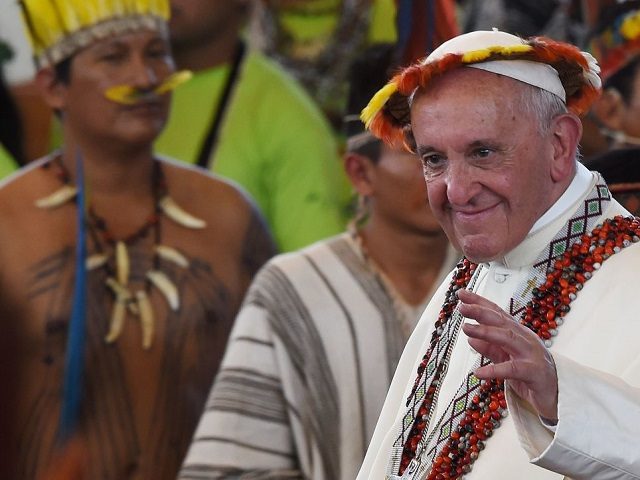Pope Francis has once again denounced an “ecological crisis” sweeping the world, which is allegedly producing a “growing exodus of climate migrants and environmental refugees.”
The pope’s words formed part of a message he sent to the Ecumenical Patriarch of Constantinople, Bartholomew I, and to the participants in an International Symposium titled “Toward a Greener Attica: Preserving the Planet and Protecting its People,” taking place in Athens, Greece this week.
Although the pope does not specify what he means by “a growing exodus of climate migrants and environmental refugees,” one must infer that he believes that significant numbers of people are leaving their homelands because of “global warming.”
The pope’s words echo recent predictions by the World Bank that more than 143 million people will be forced to migrate by 2050 thanks to climate change.
In its report, titled “Groundswell: Preparing for Internal Climate Migration,” the World Bank declared that internal migration will be an even more serious problem than international migration, as “droughts, failing crops, rising sea levels, and storm surges” drive tens of millions to uproot from their homes and resettle in other areas of their region.
Focusing on three regions — Sub-Saharan Africa, South Asia, and Latin America – the report warned that “unless urgent climate and development action is taken, these three regions could be dealing with a combined total of over 140 million internal climate migrants by 2050.”
In the full-color graphic of the report, the Bank assured readers that “by 2050—if no action is taken—there will be more than 143 million internal climate migrants” across the regions examined in the report.
“The poorest people will be forced to move due to slow-onset climate change impacts,” the report stated, in language more commonly used for cancer patients. These impacts will include “decreasing crop productivity,” “shortage of water,” and “rising sea level.”
The World Bank, which together with the International Monetary Fund was created at an international conference convened in Bretton Woods, New Hampshire in July 1944, has transformed itself from an international financial institution into a prophet of climate fallout.
In its own cautious analysis of the World Bank’s remarkably precise forecasts, Scientific American noted that the “study of climate migration is still relatively new, and projections of just how many people might be driven from their homes as the world warms are hard to pin down.”
“Predictions of climate change impacts carry an inherent uncertainty, and the reasons people decide to migrate—or are forced to—are often complex,” it added.
It was Scientific American, in fact, that recently broke ranks with the climate change alarmists by urging readers to “chill out” over global warming. Human ingenuity and adaptability are never factored into doomsday climate scenarios, it argued, while these elements are absolutely essential.
This uncertainty and complexity do not seem to worry Pope Francis.
“It is not just the homes of vulnerable people around the world that are crumbling,” he said in his message. “In the wake of the ecological crisis we ought to undertake a serious examination of conscience regarding the protection of the planet entrusted to our care.”
“The ecological crisis now affecting all of humanity is ultimately rooted in the human heart, that aspires to control and exploit the limited resources of our planet, while ignoring the vulnerable members of the human family,” he added.
Follow Thomas D. Williams on Twitter Follow @tdwilliamsrome

COMMENTS
Please let us know if you're having issues with commenting.